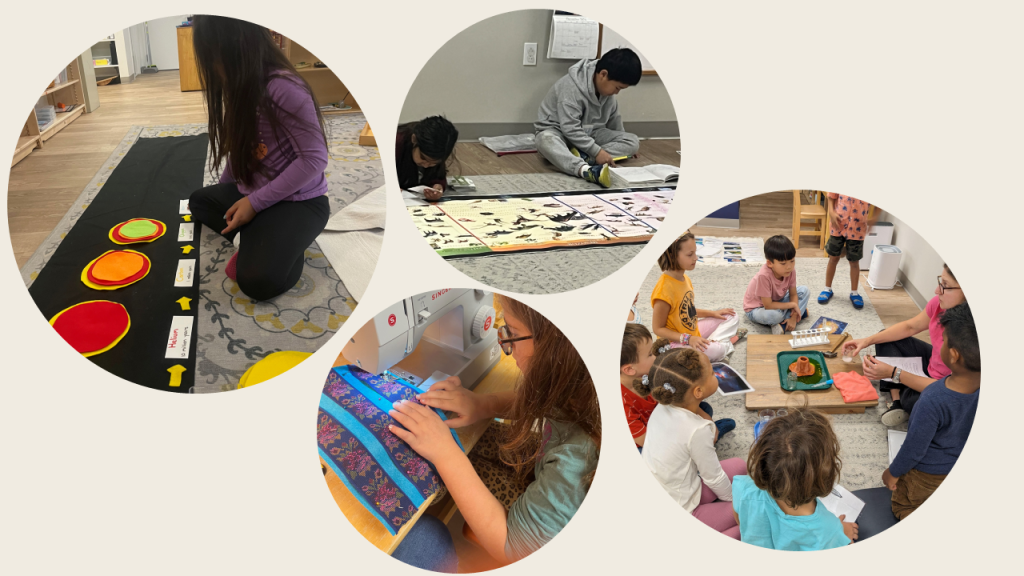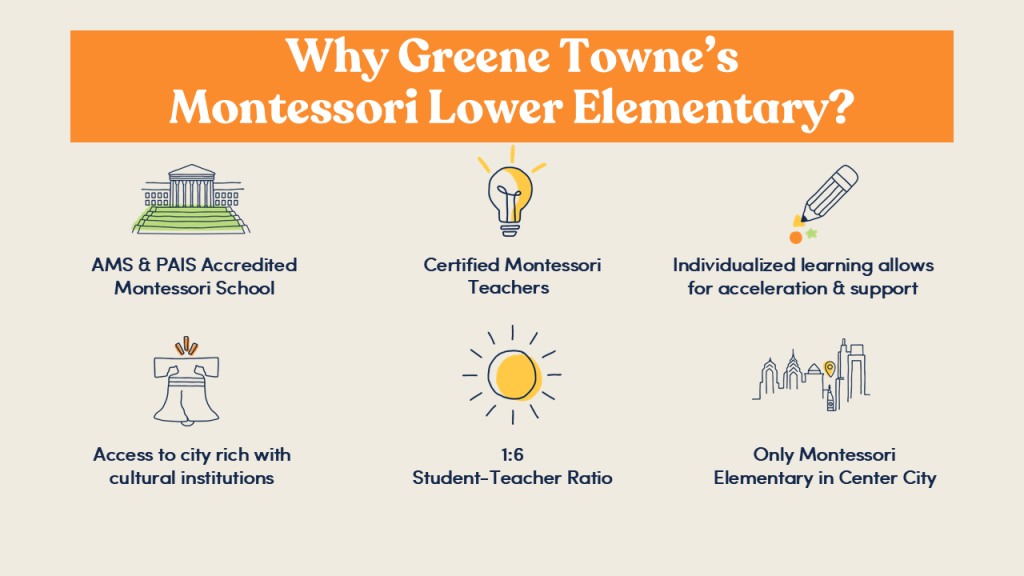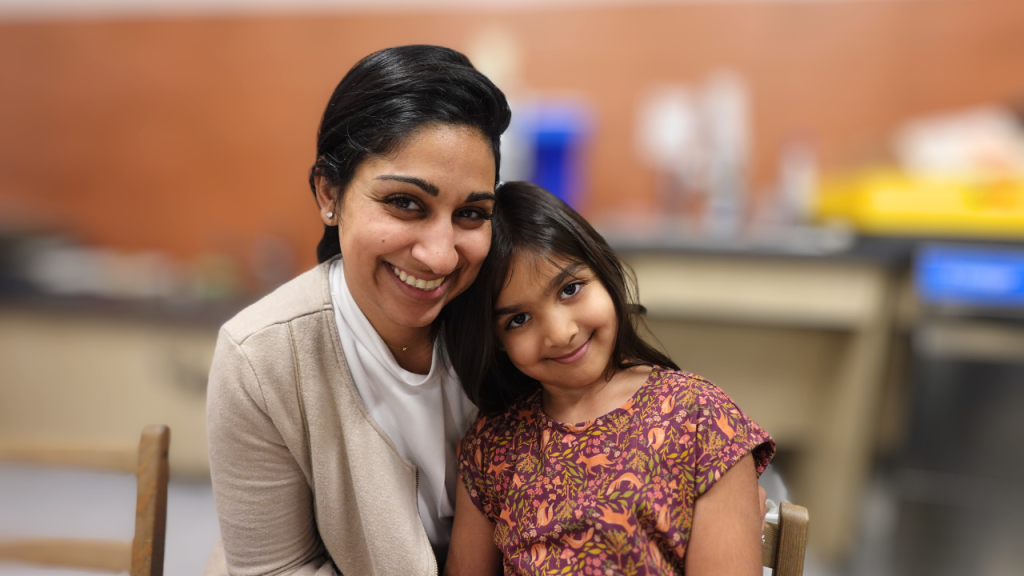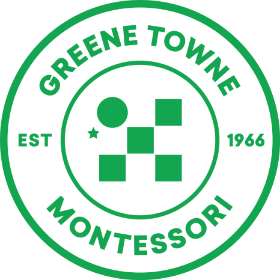Lower Elementary
Greene Towne Montessori introduced Lower Elementary (1st – 3rd grades) in Fall of 2023, the first of its kind in Center City Philadelphia and in the school’s history! We are pleased to offer this to current Greene Towne families as well as families coming from other Montessori Primary programs.
For children who have completed the Montessori Primary program, the Lower Elementary program continues the familiar pedagogy – a mixed aged classroom, individualized instruction and evaluation. In addition, Lower Elementary includes continuity with familiar routines and learning materials that offer new lessons and opportunities for more complex exploration and discovery while supporting children’s physical, social-emotional, and intellectual growth.


The Parent Perspective on Choosing Greene Towne’s Lower Elementary Program

“We chose to send our son to Lower Elementary at Greene Towne because of its loving and inclusive community. It is a community that genuinely cares about the students’ growth and development. ”
– Xiaoyu, current parent
“When I learned more about Greene Towne’s Lower Elementary curriculum materials, the methodology of learning compared to other schools, nothing came close. It is an incredibly unique way of learning. Specifically, how they learn grammar and the fundamentals beyond just memorization.”
– Kernika, current parent

The following articles are from Tomorrow’s Child.
Student-Teacher Relationship
-
- Students are with the same teachers from 1st-3rd grades.
-
- Teachers are continuously observing students and assessing their aptitude to design individualized instruction.
-
- Teachers get to know what inspires and drives your child and support their individual way of learning.
Mixed-Aged Classroom Community
-
- A mixed-aged classroom community is the hallmark of a Montessori classroom. It provides an opportunity for older students to serve as leaders and mentor the younger students while the younger students aspire to become leaders and mentors.
-
- Students are actively engaged members of the community and are exposed to diverse ideas and perspectives.
-
- Students have agency to develop their individuality while respecting and caring for the school
community.
- Students have agency to develop their individuality while respecting and caring for the school
Prepared Environment
-
- An intentionally prepared classroom provides a space for students to explore and engage within a structured environment.
- Hands-on experiential learning
- Independent group learning
- Cross curricular by design
- Individualized curriculum
Seamless Continuation of the Montessori Method
-
- Familiarity with the environment and learning process means students can dive deeper, rather than starting over.
-
- Builds on the same materials and concepts introduced in Primary, allowing students to move from concrete to abstract understanding at their own pace.
Social and Emotional Learning Woven into the Curriculum
-
- Our program integrates emotional and social development into daily academic life – helping students build empathy, resilience, and confidence through collaborative work, conflict resolution, and meaning relationships
Emphasis on Executive Function Skills
-
- Critical Thinking and Problem Solving
- Time Management and Accountability (example: setting own work schedule, with teacher guidance, to complete and accomplish goals.)
- Leadership Development (examples: help with arrival, modeling behavior, visiting classrooms to read to, provide lessons to, and make presentations to younger children.)
- Public Speaking
Strong Teacher-Student Relationships
-
- Multi-year relationships allow teachers to truly know the child – academically, emotionally, and socially – and support them over time.
Snapshot of your Child’s Day/Week
-
- Morning Work Cycle | 8 – 11:30 a.m.
Individual and small-group lessons
Long-term project work with increasing independence
Student-led meetings that foster decision-making, collaboration, and self-expression - Recess & Lunch | 11:45 a.m. – 1:15 p.m.
Outdoor play at rooftop or nearby playgrounds
Family-style lunch to support independence and social growth - Afternoon | 1:15 – 3 p.m.
Quiet reading time and afternoon Work Cycle (see above)
Weekly “Going Out” excursions enrich Science, History, Art, and Music through real-world experiences
Specials: Physical Education, Art, and Music
- Morning Work Cycle | 8 – 11:30 a.m.
Homework
-
- In Greene Towne’s Montessori Lower Elementary, work outside of school, “homework,” includes service to others, practicing reading, and contributing to household responsibilities. For example, children write grocery lists and help calculate a household grocery budget, prepare meals and/or fold laundry. In the classroom as students move away from didactic materials to abstract concepts (typically around 3rd grade), traditional homework (such as worksheets) becomes more appropriate and a way to reinforce concepts being taught in school.
Technology in the Classroom
At this stage of development, students continue to learn best through sensory experiences and hands-on activities. Technology is used primarily as a support tool to enhance learning in the following ways:
-
- Developing Literacy: Technology aids in literacy development at an age-appropriate level, offering interactive and engaging ways to strengthen reading and writing skills.
- Conducting Research: Technology allows students to gather information, which is then printed out to read on paper – combining digital tools with traditional learning methods.
- Organizing and Presenting Research: Technology provides students with tools to organize and present their findings, as well as support creative writing projects.
- Connecting with Experts: Through platforms like Zoom, students can connect with experts in various fields, allowing them to gain valuable insights and learning experiences, especially when a physical field trip isn’t feasible.
- Global Connections: Technology opens opportunities for students to connect with Montessori Elementary Schools across the U.S. and around the world, broadening their perspectives and understanding of different cultures and educational practices.
The Montessori Elementary curriculum* contains the following areas of learning:
Practical Life
Within the Elementary program, the Practical Life curriculum expands from the foundation laid in Early Childhood. Practical Life at the Elementary level shifts from a focus on self-care and fine motor skills, to skills that help students connect with their interests in the outside world, organize their time, and take part in their community. While self-care and appropriate social interactions continue to be supported, lessons that teach responsibility are the focus. Use of tools, such as work plans, to support organization and time management skills, are incorporated into the daily routine.
Math
The ideas of number concepts, place value, numerals, and related quantities are reinforced and expanded upon within the Elementary program. Newfound purposes for familiar math materials provide students with the means to consider number concepts, mathematical operations, and more complex functions, helping to expand advanced mathematical knowledge and understanding.
Language
Reading and writing are integral to all subjects in Montessori Elementary, as students express their interests and satisfy their curiosity. Students master conventions with thorough studies of grammar, spelling, and mechanics. They produce final copies with careful penmanship and keyboarding. They read, analyze, think critically, and compare and contrast literature to support personal opinion and perspective. Using these reading and writing skills, they present ideas through formal and informal presentations.
Cultural Studies
Cultural studies are interdisciplinary and integrate zoology, botany, geography, geology, physical and life sciences, and anthropology. Through these lessons, students explore the interconnectedness of all living things. Additionally, in-depth studies of history, physical and political world geography, civics, economics, peace and justice, the arts, world language, and physical education are introduced.
Science and Social Studies
Interdisciplinary and integrated studies of geology, geography, physical and life sciences, anthropology, and history are built around “Great Lessons,” a series of dramatic stories that explore the origins of the universe, our planet, and the continuous development of human advancement.
The laws of physics and chemistry reveal the interdependency of all living things. Beginning with a study of civilization, students explore the contributions of history and what it means to be a responsible citizen and to seek ways to make the world a better, more peaceful place.
*from American Montessori Society (AMS) website

Greene Towne’s LE program is co-led by Shelby Feldman and Brandon Och.
Shelby Feldman has been with Greene Towne for several years and received a BS in Early Childhood Education from Temple University, a MEd from Chestnut Hill College, and both a Primary and Lower Elementary Teaching Certificates from the American Montessori Society. Shelby has more than 10 years teaching experience in a variety of educational environments.
Brandon Och received a BA in Philosophy from Temple University and a Teacher Certificate from the American Montessori Society. He has 15 years of experience with Greene Towne, including over five years serving as a Lead Primary Teacher.
Greene Towne’s Lower Elementary has one tuition rate and is affordable and all inclusive.
Applicants from area Montessori Kindergartens are considered through an admissions process to ensure that Greene Towne is a good match for their educational journey. Previous Montessori experience is required to be considered. To inquire about enrollment, contact admissions@gtms.org.
Greene Towne offers after school enrichment programs to students. Examples include Art, Martial Arts, Yoga, Fabric Arts, LEGO Club, and Cooking.
When you prepare to take the next step in your child’s educational journey, Greene Towne is here to support and guide you through the process.
Co-Directors of Enrollment Management
215-563-6368 x233


